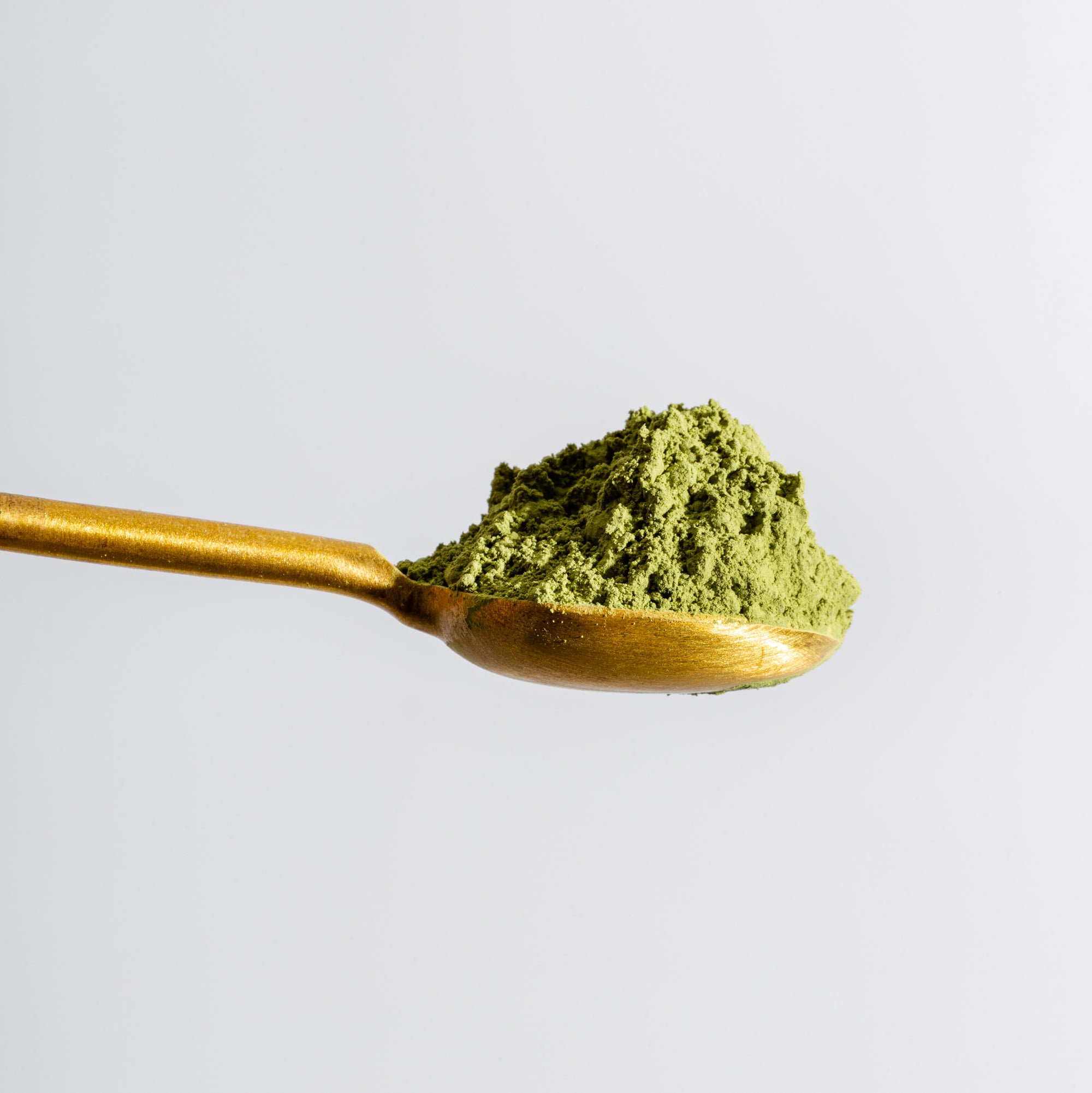
L-theanine is known as one of nature’s most relaxing compounds. In fact, if you’ve ever struggled with sleeplessness, you might have taken a supplement that contains it. Enjoyers of black tea, green tea and white tea will also be familiar with this amino acid, although they might not know it yet.
Together, we’ll learn about what L-theanine is, where to find it, and the potential health benefits it has for the body. We’ll also talk about its impact on brain health, possible side effects, and understand what happens when you combine L-theanine and caffeine together.
Get ready — we’re about to dive deep into the world of alpha waves, glutamate receptors, and neuropharmacology. We promise it will be fun!
What Is L-Theanine?
L-theanine is a plant-based compound that is classified as an amino acid. When we think of amino acids, most of us automatically think of protein. However, L-theanine is classified as a non-proteinogenic amino acid (NPAA), which means it’s not an amino acid involved in protein synthesis.
Instead, L-theanine comes from plants and is responsible for numerous biological and protective functions in the plant. L-theanine occurs naturally in tea leaves, especially in green tea and black tea, and certain mushrooms.
The active compound in L-theanine is glutamylethylamide, which is able to pass the blood-brain barrier and is important for supporting brain health.
How Does L-Theanine Impact the Brain?
Because L-theanine is able to cross the blood-brain barrier, it has neuroprotective effects that warrant exploration.
L-Theanine and Neurotransmitters
L-theanine has pharmacological effects on brain health because it is able to modulate neurotransmitters and increase inhibitory neurotransmitter GABA levels, enhancing glycine and dopamine release. That was a mouthful – let’s dive in!
GABA
L-theanine can also increase levels of GABA, a neurotransmitter that helps relax the nervous system by lowering the levels of communication between nerves in the brain.

Dopamine
L-theanine can also increase the expression of dopamine. This neurotransmitter is part of the brain’s reward system, and is responsible for feelings of pleasure and motivation.
Serotonin
Finally, L-theanine can increase the expression of serotonin, a neurotransmitter that affects everything from mood to body temperature and sleep. Serotonin also influences memory and learning.
L-Theanine and Brain Waves
Diving even further into brain health, L-theanine has a particularly interesting effect on brain waves. L-theanine increases alpha brain waves, which have been found to support a healthier stress response, enhance attention, creativity and relaxation, but without inducing drowsiness — a state of “alert calm” similar to the state of mind experienced when meditating.
The best part? Since alpha waves don’t cause you to feel tired, you can use L-theanine not only at night when you need to calm your mind and prepare for sleep, but also during the day for its amazing array of health benefits.
What Are the Benefits of L-Theanine?
L-theanine is a stress response modulator, has antioxidant properties, and helps support cognitive function and sleep quality. Want to learn more? Read on as we dive into exactly how l-theanine provides these benefits.
Stress Response
Because l-theanine helps increase alpha wave activity, which helps calm and relax the brain, it's able to help you feel cool under pressure and buffer stress.
In a randomized, placebo-controlled, and double-blind trial that involved healthy adults, L-theanine was able to reduce psychological stress symptoms, aid in sleep, and help protect cognitive functions like verbal fluency.
Cognitive Function
If you struggle with an inability to focus or temporary cognitive impairment, L-theanine might be able to help. One study found that a single dose of L-theanine helped reduce reaction time to attention tasks and increased the number of correct answers while decreasing the number of omission errors in working memory tasks.
Antioxidant Properties
We need antioxidants to protect the body against free radicals. Free radicals are unbalanced molecules that can damage our cells through a process called oxidative stress. Our bodies naturally produce free radicals during metabolic processes, as well as in response to external stressors like UV rays, cigarette smoke, and pollution.
Antioxidants have a protective effect, essentially shielding our cells from free radical damage, and L-theanine’s antioxidant properties are strong and well-documented. Who knew your daily cuppa could back such a punch?
What Are the Side Effects of L-Theanine Supplements?
L-theanine is generally recognized as safe, but there are some side effects of theanine of which you should be aware.
L-theanine modulates blood pressure. If you’re on a blood pressure-lowering medication, the ingestion of L-theanine could cause your blood pressure to drop too low. If you are pregnant or breastfeeding, it’s important to consult a healthcare professional for medical advice before starting any new supplement routine.
Where Can You Get L-Theanine Naturally?
L-theanine is found in only a small number of botanicals. We’ll look at which ones and tell you which is the best for getting the most L-theanine.
Tea Leaves
Found abundantly in tea leaves, any type of tea brewed from leaves of the Camellia sinensis plant (not to be confused with herbal “teas”) will deliver both L-theanine and caffeine. Green tea contains more L-theanine than white, oolong or black tea, while oolong and black tea contain the most caffeine. So if you’re looking for the highest L-theanine and lowest caffeine punch, green tea may be your best choice.
Matcha
Matcha is a form of highly concentrated green tea. Green tea has numerous health benefits, but when brewed, many of the important catechins and plant compounds remain in the tea leaves instead of infusing into the water. When you drink your tea, a lot of this good stuff gets left behind.
Matcha is a solution that gets more of these compounds into your bodily tissues because it is created from whole ground green tea leaves that are shade-grown to prevent the sun from leaching their nutrients. You then add the powder to water or steamed milk and drink it, so you’re actually ingesting the whole tea leaf. This means you get all of the benefits and nutrients without leaving any behind.
Mushrooms
You can find L-theanine in one particular species of mushroom: Boletus badius, which is a relative of porcini mushrooms. Sold as “bolete” mushrooms, these are usually only found in dry form, and are rarely ever fresh.
Supplements
While you can find L-theanine in teas that come from the Camellia sinensis plant, it might be hard to get a lot of it if you aren’t particularly accustomed to drinking tea. Enter supplements as a go-to source for getting L-theanine without brewing a single cup of tea.
One of the best ways to get L-theanine is through the use of a matcha dietary supplement. Our Focus Matcha Superblend, for instance, is easy to add to smoothies, shakes, or just to your favorite non-dairy milk to create a delicious latte. You can also add our Focus Matcha Superblend to numerous recipes to create L-theanine-rich snacks, such as these matcha mint chocolate chip ice cream sandwiches.
How Does the Combination of L-Theanine and Caffeine Affect the Body?
If you get tired of the jitters and crashes associated with drinking too much caffeine, switching to matcha is a good alternative. L-theanine and the caffeine found in matcha (a lower amount per serving than in coffee) work synergistically to improve cognitive performance and promote focus and alertness without the jitters.
Plus, those alpha waves that L-theanine promotes also moderate the stimulating effect of the caffeine in matcha, allowing the body to sustain focus and alertness over a longer period of time than with caffeine alone — and without the caffeine crash associated with a cup of joe.
The Bottom Line
L-theanine supplementation can help you increase your cognitive performance, help you avoid the jitters and crashes associated with drinking too much coffee, and offer antioxidant support that can help prevent diseases and illnesses associated with oxidative stress.
Your healthcare provider can help you decide if using an L-theanine supplement is right for you and whether or not matcha is a good match. If you decide to match up with matcha, JOYÀ can help you get the L-theanine you need easily and flavorfully. To learn more about how to use matcha, check out our recipe blog for chef-crafted recipes developed by our very own founder.




